- Home
- Peter Swanson
Her Every Fear Page 8
Her Every Fear Read online
Page 8
George didn’t have a Facebook profile, and even though she did, she rarely posted. It never occurred to her that he might read the post. In retrospect, she knew that she’d been stupid, but what she had really been was hopeful. Hopeful that George was moving on, like she was. But George did read her post. He knew the cottage because they’d been there together before, on a minibreak holiday with her family. Years later, Kate wondered how long he’d been in Windermere watching her and following her before he made his appearance. She never sensed him, exactly, although it had been a blustery, dark-skied week, and Kate had had premonitions of death in her troubled sleep. For the first few days of the trip, Kate had shared the cottage with Sadie, her younger cousin, visiting from two villages over. George had probably been watching them, waiting for a moment when Kate was alone. He’d been sleeping rough in a wood nearby. Afterward, after all that had happened, they’d found his tent and a sodden sleeping bag hidden in a copse.
Midway through the week, and the first night that Sadie hadn’t slept over in the cottage, Kate woke at just past midnight to find George seated next to her bed, the rifle lying casually across his lap. Kate had opened her mouth to scream and George had leapt on her, his knees on her chest, and pushed the oily barrel of the gun hard against her mouth, splitting her lip and breaking a tooth.
He held her like that on the bed for over an hour, telling her in a strange, flat monotone how she deserved to die for what she’d done to him. The way he spoke, the words he used, felt like they were coming from an entirely different person than the George she had known.
Kate quietly wept the whole time, her mind telling her that the death she’d always feared was now here, crouched on her chest. She didn’t try to bargain or appeal to George’s humanity. She submitted, her body going limp like a bird caught in the jaws of a cat. Her bladder released and she didn’t even realize it till she smelled the sharp smell of her own urine. Her submission probably kept her alive. If she’d fought back, tried to convince George to not kill her, her words would probably have been enough to allow him to pull the trigger. Instead, he dragged her across the floor and pushed her into the small, cramped closet, shutting the door and jamming it with a wooden chair. Maybe he did it because he knew the dark, tight closet was a fate worse than death for Kate. Maybe he did it because after being unable to kill her, George simply wanted Kate out of his sight. Trapped in the closet, Kate began to scream uncontrollably, violently, till her vocal cords were raw. And then she wept until, finally, she stopped weeping, curled into a tight ball, and felt nothing.
It could have been two hours or twelve hours later when she heard the explosion of the rifle on the other side of the closet door.
Two days later, Kate’s cousin returned to find her. The front door of the cottage was unlocked, and George’s body was on the floor in front of the barricaded closet. The contents of his skull were spread across the rug.
It was the police who pulled Kate from the closet. She was conscious but unresponsive. Her eyes were squeezed shut, so she didn’t see the remains of George Daniels as she was carried from the house. She spent three months in rehab—half of that time unresponsive—before she went home to her parents.
She never returned to university.
Five minutes after sending her mother the e-mail about Audrey Marshall, she received a reply:
Terrible, darling. Your father and I say come home. Has someone told Corbin?
But it has nothing to do with me, Kate began to write back, then stopped herself. Her fingers rested, unmoving, on the keys of her laptop. She deleted the words. She’d reply to her mother later. She’d reply after she figured out what to do, and she hadn’t done that yet. She wanted to stay, and begin her course tomorrow, because Audrey’s murder (did she even know it was a murder?) really did have nothing to do with her.
You don’t believe that, do you? George’s voice, but also her own.
Maybe it has something to do with me. Because it has something to do with Corbin, and I’m in his apartment. The police have been here, and Audrey’s friend knew something about what might have happened.
Suddenly, the high-ceilinged apartment felt cramped and too warm. And was it her imagination, or had it turned darker? She turned to the tall windows and saw that an inky cloud had crossed in front of the sun. She watched it continue on its path, till the sun was shining again. Still, the sun was lower in the sky than it should be. She checked the time on her cell phone and discovered it was almost five in the afternoon. How had it gotten so late so fast? She’d been thinking of George, of course, and sometimes when she did that time would slip away. Like it had in the closet when she’d been eaten by the darkness and by time itself. She didn’t even think of it as a closet. It had been a room, the smallest room, and she had never left it. It was dark, and all four walls pressed against her.
Go outside, she told herself, and eat a proper meal. And she found herself standing, her head light with lack of food. Before she had too much time to think about it, she grabbed her coat, and an umbrella just in case, and forced herself to leave the apartment.
Chapter 10
Alan had been pacing back and forth across his apartment, steeling himself to go over and talk with Kate, Corbin’s cousin who was staying at his place. He wanted to find out what she knew about Audrey and Corbin, even though he knew that the very act of speaking with her was going to reveal his own interest. He’d already told her that he barely knew Audrey. What would he tell her now? The truth? Part of the truth?
He looked out his window, as he’d been doing all day long. The police had not returned. The courtyard was quiet.
He walked to the mirror that Quinn had hung next to the front door. He rubbed at the skin below his eyes as though he could rub away the dark hollows. He wore his favorite vintage blazer and a knotted cashmere scarf. He’d put the scarf on so long ago—preparing himself to leave—that his neck had gotten sweaty. He took it off. Why would he need a scarf just to go across to another apartment?
He paced back to the window and saw Kate crossing the courtyard toward the street. Without thinking, he bolted to his bedroom, grabbed his wallet, then raced out his own door, taking the stairs down to the lobby three at a time.
By the time he reached the courtyard Kate had disappeared, but when he reached Bury Street he spotted her a block and a half away, making her way toward Charles. He began to follow. It was cooler than he thought, and he regretted taking off his scarf. He buttoned all three buttons on his blazer and turned the collar up. The clouds were building up in the sky again and he wondered if it might rain.
When Kate reached Charles, she stopped for a moment. Alan slowed his pace. He was only about half a block away, close enough to see that she held a small orange umbrella in her left hand. She turned left. Alan wondered if she was looking for a place to eat, or if she was just taking a walk. Either way, he’d follow her. It would be easier to approach her in a restaurant, pretend that he was also there for dinner. It might look suspicious, but he did live in the neighborhood.
Charles Street was quiet, mostly dog walkers and mothers pushing strollers. A man with a stricken face hustled past carrying a bouquet of expensive-looking flowers. A husband who’d forgotten an anniversary, Alan thought. Kate was walking slowly, pausing to look through the windows of the many small bistros that lined this stretch of Charles. She was clearly looking for a place to eat. Alan forced himself to walk slowly as well, pausing at one point in front of an old carriage house that had been converted into a swank residence. He bent and tied his shoe. The brick sidewalk was still wet from an earlier shower, and he could smell an earthy scent, the smell of spring. Winter, always long in New England, had been particularly brutal this past year, dumping over four feet of snow in a two-week stretch at the end of January.
Alan watched Kate cross the street. She was hesitant, looking to the right and left as though she couldn’t remember which way the cars would be coming from. Alan followed her across Charles, then up a n
arrow gaslit side street where she entered a place called St. Stephen’s Tavern that Alan had never been to, even though he’d passed it frequently.
He kept walking, not wanting to look like he was following her. She was probably eating, which meant she’d be there for at least an hour. Alan decided he had time for a quick drink down at the Sevens before showing up at St. Stephen’s. He walked fast, down the impossibly steep side street, then back onto Charles, where he pushed through the door into the narrow interior of his favorite bar. He ordered a rye and ginger ale, and drank it standing up, elbow perched on the wooden bar.
He was in a state of nervous excitement, he realized, from following this woman he barely knew. What was wrong with him? Maybe his obsession with Audrey had had nothing to do with Audrey herself and everything to do with the fact that he could watch her from afar.
Not for the first time, an uncomfortable memory resurfaced. He’d been thirteen years old, and his sister, sixteen at the time, had a summer job as a camp counselor in Maine. His parents had put him on a bus to visit her one weekend, and he’d been given a spare room in the counselors’ area, a row of dorm-style rooms on the second floor of the main lodge. On his first night there, he’d discovered a knothole in one of the planks of wood that allowed him to see into the adjacent bedroom. With his own lights off, he’d watched a female counselor, a chubby girl with small breasts, about his sister’s age, undress. She put on an oversized T-shirt with the logo from the camp on it, and got in bed to write in her diary. After only about three minutes of writing, she laid the diary on her chest and, with her lamp still on, began to touch herself between her legs. Alan watched, rapt and fascinated. He knew what masturbation was, and had shamefully done it himself, but hadn’t known that it was something girls did. The girl began to rub more furiously, then stopped suddenly, closed her diary, slid it under her bed, and turned off the lamp.
Alan lay in the blackness, straining to hear anything through the pine walls. He thought he could hear the rhythmic squeak of cheap bedsprings, but then it stopped. He heard a long sigh, the girl letting her breath out as though she’d been holding it. Then nothing.
The next day he spotted the counselor in the dining hall at a table with some of the younger campers. He’d barely looked at her face the night before, but he studied it now. It was all circles. She had full cheeks and round eyes, and Alan even noticed that her small ears, unpierced, were perfectly round as well. She was laughing uproariously at something one of the campers, a girl with red hair, had just said. The girl flushed, and the counselor put her arm around her, pulling her against her side. She was pretty, the counselor, especially when she smiled, and Alan could hardly believe what he had seen her do the night before. It didn’t exactly fit in with the way she was acting now.
“You okay there, little brother?”
Alan was eating at the visitor’s table, but Hannah, his sister, had come over to see him. “Fine,” he said.
“You looked like you’d been hypnotized. You wanna go on a blueberry-picking trip with cabin five today, or would you rather just hang out by the beach?”
Alan picked the beach, bringing a copy of Red Dragon that he’d found in the counselors’ quarters. He could swim in the shallow, roped-off section of the lake, but since he hadn’t taken his deep-water test, he was banned from swimming off the pier. It was fine with him. He was happy to sit on the beach with his book open in front of him, hoping to see the counselor from the adjacent bedroom. He never saw her by the water, but spotted her later giving tennis lessons to several campers and then at dinner, which was an outdoor barbecue. Each time he spotted her he felt a sickening but addictive rush of adrenaline. He could barely wait for nighttime, when he hoped to see her through the knothole again. He told his sister he had a stomachache and got back to his room early. He turned off his light and waited, feverishly imagining what she might do when she returned to her room.
But when she did show up, she grabbed her robe and a shower caddy and disappeared to the showers. When she returned she was wearing her nightshirt under the robe and slipped immediately into her cot. She was less than a foot away from the wall, and Alan could see the fine blond hairs on the tops of her thighs. She took a deep, yawning breath that turned into a coughing fit, then turned the light out. Alan lay back on his bed and listened to hear if she was touching herself again, but he heard nothing. He thought he could smell the faint, stale odor of cigarettes. She began to breathe deeply. Eventually, he fell asleep.
He never saw her again. If she was at breakfast the following morning he couldn’t find her, and after breakfast Hannah drove him to the bus station. Alan still remembered the gutted feeling he’d had as the bus chugged away from the station. He would never see the nameless counselor again. She was gone forever.
He finished his drink, paid, and walked out of the Sevens.
Outside, Alan noticed that the trees, starting to blossom, were newly wet. There must have been a passing shower while he’d been in the bar. The air smelled clean, and all the brick sidewalks had darkened.
He walked up the hill toward St. Stephen’s and entered through its frosted glass doors, telling himself to look casual and go straight to the bar, which he did. He ordered another rye and ginger from the pretty bartender in a tight Bruins T-shirt, then leaned back a little on the swivel stool and glanced around. St. Stephen’s was not a whole lot bigger than the Sevens. There was room enough for a long wooden bar and about a half-dozen booths. At the bar were two men, each drinking stout and each looking at their cell phones. Alan couldn’t tell if they were together or simply seated next to one another.
Most of the booths were empty, but one held a husband and wife with their two kids, and at another was a lone woman looking at a laptop. She had dyed red hair, and was so short that her feet dangled from the booth’s wooden seat.
Alan turned as the bartender was placing his drink in front of him. He thanked her and took a sip. He drank from his straw, and the first sip was pure alcohol. He stirred the drink and removed the wedge of desiccated lime. There was no sign of Kate. Maybe she’d just come in for a single drink and then left. Or maybe there was a back dining room that Alan couldn’t see. He was about to ask the bartender when the ladies’ room door swung open with a harsh metallic screech. Alan turned, and there was Kate.
Chapter 11
After using the dingy toilets, Kate pushed her way back into the restaurant. There, sitting at the bar, was Alan Cherney, looking in her direction. Their eyes met. A warning went off in her head. Had he followed her here? And if so, why?
He swiveled minutely on his bar seat, scrunching his brow as though trying to place her. She stepped forward.
“Hiya,” she said.
“Hello,” he answered. He wore a beautiful tweed coat, and under it, a shirt with a frayed collar.
“Kate Priddy. I’m in your building. In Corbin Dell’s apartment.”
“Oh right. Right. I know that. It’s Alan.”
“Yes, I remember you. You just here for a drink? Is this a place you come to a lot?” Kate inexplicably laughed after asking this question. Whatever ease they had had when they first met had disappeared. Maybe it was because Alan, in the dim light of the tavern, looked like a nervous public speaker facing a massive audience.
“No, no,” he said. “I’ve come here before, maybe once, but not too often. How did you even know about it? I lived here for a year before I found it.”
“Corbin recommended it. I’m eating dinner.” She indicated with a turn of her head the farthest booth, directly underneath the tavern’s lone television, silently showing highlights from a golf match being played somewhere sunny and warm.
“Well, I don’t want to interrupt you—”
“No, join me,” Kate said, surprising herself. “Unless you have—”
“No, I’d love to.”
Alan brought his drink over and sat across from Kate, who was halfway through her second glass of wine. Her bowl of chicken chili had arrived wh
ile she’d been in the toilets. It was enormous, on a plate that was festooned with multicolored tortilla chips. “Have you eaten?” Kate asked.
“No, I haven’t, but . . .”
“But you took one look at my dinner, and . . .”
Alan laughed. “No, I’m just not that hungry. I keep thinking about Audrey. Remember, we talked about her.”
“I know. It’s terrible. The police came and talked with me.”
“Yeah, me too. Well, they took a statement.”
“Did they search your place?”
“No, did they search yours?”
“Briefly.”
“Huh.” Alan shifted in his seat, crossing his legs under the table and bumping a knee.
Kate then told him about Jack Ludovico, Audrey’s friend, who she’d talked to on the street. Alan listened intently, sipping at his drink.
“What did he look like?” Alan asked when Kate had taken a break from talking to eat her rapidly cooling chili.
Kate hesitated. Alan’s rapt attention was unnerving somehow. Maybe she shouldn’t have invited him to join her. “Only if you tell me why you’re so interested,” she finally said. “I know you said you barely knew Audrey, but I don’t know if I believe you.”
She watched as Alan made up his mind. His expressive face seemed to register everything, and Kate wondered if he knew that about himself, knew how easy it was to read him. “Okay,” he said. “I didn’t actually know Audrey Marshall. We never met, but I could see her through my window in my apartment. I have the place opposite her and we both look over the courtyard, so sometimes I watched her—I know that sounds incredibly creepy, but it wasn’t like that. I couldn’t see into her bedroom, or anything, but sometimes I watched her reading in her living room. She just seemed very nice.”

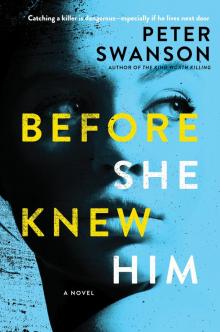 Before She Knew Him
Before She Knew Him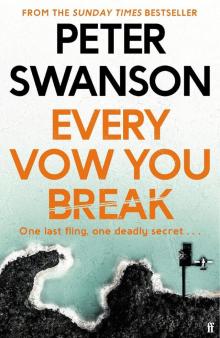 Every Vow You Break
Every Vow You Break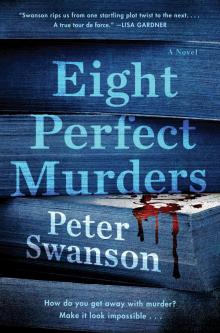 Eight Perfect Murders
Eight Perfect Murders Rules for Perfect Murders
Rules for Perfect Murders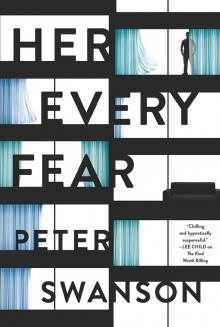 Her Every Fear
Her Every Fear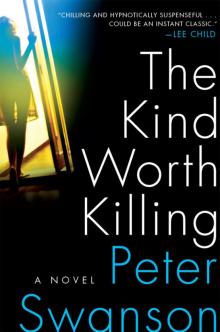 The Kind Worth Killing
The Kind Worth Killing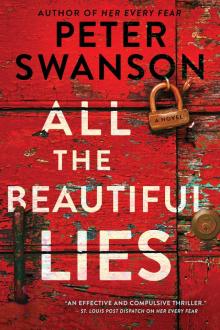 All the Beautiful Lies
All the Beautiful Lies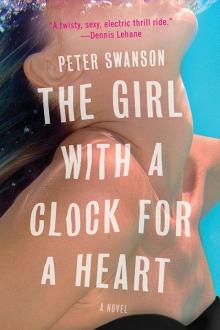 The Girl with a Clock for a Heart: A Novel
The Girl with a Clock for a Heart: A Novel